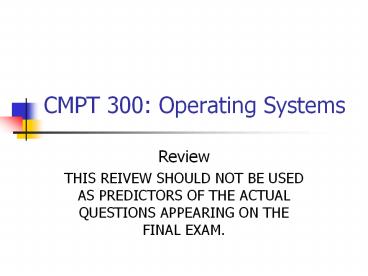CMPT%20300:%20Operating%20Systems - PowerPoint PPT Presentation
Title:
CMPT%20300:%20Operating%20Systems
Description:
CMPT 300: Operating Systems. Review. THIS REIVEW SHOULD NOT BE USED AS PREDICTORS ... Benchmarks: turnaround time, throughput, response time. FCFS, SJF, RR, MQ, etc ... – PowerPoint PPT presentation
Number of Views:122
Avg rating:3.0/5.0
Title: CMPT%20300:%20Operating%20Systems
1
CMPT 300 Operating Systems
- Review
- THIS REIVEW SHOULD NOT BE USED AS PREDICTORS OF
THE ACTUAL QUESTIONS APPEARING ON THE FINAL EXAM.
2
What Will Be in The Final Exam?
- Concepts Definitions
- E.g., working set, aging
- Conditions Assumptions
- E.g., conditions of deadlocks?
- Pros Cons
- E.g., contiguous allocation Vs. linked list
- Events
- E.g., interrupt, page fault
- Algorithms
- E.g., Petersons solution, scheduling algorithms
- Data structures
- E.g., page table, process table
3
How to Go Over the Materials?
- Read text book and lecture notes
- Reading lecture notes only may not be enough
- Understand the concepts and definitions
- Keep thinking
- Relation between concepts
- E.g., DMA Vs. paging
- Why does an algorithm work here?
- Extensions and implications of principles
- E.g., strict alternation, Petersons solution
4
Ch01 Overview of OS
- OS structures
- Hardware
- CPU, memory, disk, bus, DMA
- Basic concepts
- Process (thread), deadlock, I/O, file system
- Sections not covered in the final exam
- 1.2. History of operating systems
- 1.3. The operating system zoo
5
Ch02 Processes And Threads
- Processes
- Differences with programs?
- States and transitions
- Process table
- Fork()
- Threads
- Differences with processes? Pros Cons?
- Kernel space Vs. user space implementation
- Typical applications ( I/O and CPU mixed task)
6
Ch02 (Cont.)
- Inter-process communication
- Race condition
- Critical region Mutual exclusion
- Busy waiting
- Disable interrupts, lock variables, strict
alternation, Petersons solution - Sleep wakeup calls, mutexes, semaphores,
monitors, message passing - Classical IPC problems
- How to apply mechanisms to solve problems?
7
Ch02 (Cont.)
- Scheduling
- Preemptive Vs. non-preemptive
- Benchmarks turnaround time, throughput,
response time - FCFS, SJF, RR, MQ, etc
- Three-level scheduling
- Sections not covered in exam
- 2.5.4 real-time scheduling
- 2.5.5 policy Vs. mechanism
8
Ch03 Deadlocks
- Conditions for deadlock
- Solutions for deadlock problem
- Ostrich algorithm
- Detection and recovery
- Avoidance
- Prevention
- Other issues
- Two-phase locking
- Starvation
9
Ch04 Memory Management
- Basic management
- Fixed partitions (single queue Vs. multiple
queues) - Degree of multi-programming
- Relocation and protection (base limit
registers) - Bitmaps Vs. linked list
- Swapping
- Scenario memory not enough
- External fragmentation (memory compaction)
- Virtual memory
- Paging pages Vs. page frames, page faults
- MMU, TLB, page table, page table entry
10
Ch04 (Cont.)
- Page replacement algorithms
- NRU, FIFO, second chance, clock, LRU, NFU, aging
- Working set, WSClock algorithm
- Assumptions, relations
- Modeling
- Beladys anomaly
- Stack algorithm
- Design issues
- Global Vs. local, page sizes, shared pages,
copy-on-write
11
Ch04 (Cont.)
- Implementation
- Page fault handling, backing stores
- Segmentation
- Advantages
- Pure segmentation Vs. segmentation with paging
- Sections not covered in final exam
- 4.6.7, 4.7.3, 4.7.6, 4.8.3
12
Ch05 I/O
- Principles of I/O hardware
- Device controllers
- Memory-mapped I/O Vs. I/O port number
- DMA Vs. Interrupt
- Principles of I/O software
- Goals
- Three approaches
- I/O software layers
- Four layers
- Functions and relationship
13
Ch05 (Cont.)
- Disks
- Structure, format, layout
- Disk arm scheduling algorithms
- RAID
- Stable storage
- Clocks
- Basic work principle
- Sections not covered in the final exam
- In 5.4, CD-ROM, CD-R, DVD, 5.4.4
- 5.5.2, 5.5.3, 5.6-5.9
14
Ch06 File Systems
- Files
- Attributes, operations
- Memory-mapped files
- Directories
- Hierarchical directory
- Path name
15
Ch06 (Cont.)
- Implementations
- Files contiguous Vs. linked list, i-nodes
- Directories directory entry, long file name
- Shared files
- Disk space management
- Free list Vs. bitmap
- Reliability
- Backup full dump Vs. incremental dump
- Consistency check block Vs. directory check
16
Ch06 (Cont.)
- Performance
- Caching, block read ahead, reducing disk arm
motion - Sections not covered in final exam
- 6.3.8 log-structured file systems
- 6.4.1-6.4.4































